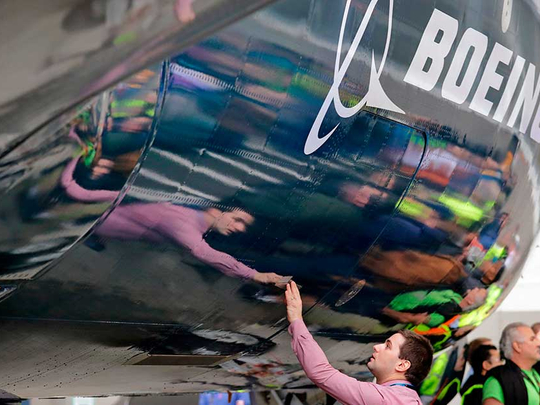
Seattle
Boeing Co reported a 57 per cent rise in profit for the first quarter on Wednesday, while also raising its full-year forecast for earnings per share and cash flow.
The world’s biggest plane maker, which sold a record 763 aircraft last year and has already announced a rise in commercial deliveries in the first three months of the year, raised its full-year operating cash flow forecast to a range of $15.0 billion-$15.5 billion from about $15 billion, previously.
The plane manufacturer’s profit jumped by more than half in the first quarter, surging past Wall Street forecasts, and strong sales of commercial jets led it to raise its forecasts for cash flow and earnings after a record 2017.
After fellow manufacturer Caterpillar Inc unnerved stock markets by warning of rising metals prices on Tuesday, the world’s biggest plane maker said in its quarterly results on Wednesday that margins had improved at the start of 2018.
Core earnings, which exclude some pension costs, jumped to $3.64 per share from $2.17 per share a year earlier, dwarfing a consensus forecast of $2.58 per share according to Thomson Reuters I/B/E/S.
Shares jumped more than 2 per cent in response.
“Well it’s not every day that a mega cap company beats consensus by 40 per cent. In normal circumstances we would expect a very positive share price response,” Vertical Research Partners Robert Stallard wrote in a note.
Boeing’s core operating margin rose to 10.7 per cent from 8.5 per cent a year earlier while revenue rose 6.5 per cent to $23.38 billion, beating expectations of $22.26 billion.
The results follow those of heavy equipment maker Caterpillar, whose shares tumbled on Tuesday after the company cautioned it would not have the same pricing power to pass on increased costs of material such as steel.
US President Donald Trump’s crackdown on steel and aluminium imports, with tariffs of 25 per cent for some steel products and 10 per cent for aluminium products, has constrained supplies in the domestic market, inflating costs of the metals.
“Trade war impact will be a topic for the call,” Morgan Stanley analyst Rajeev Lalwani said.
“The good thing is that Boeing tends to have multi-year contracts in place, general inflationary adjustments on sales, and raw materials are a relatively modest portion of a plane’s costs.” Boeing’s commercial aircraft deliveries rose 9 per cent to 184 in the first quarter ended March 31, largely seen as the result of booming passenger air travel and resulting orders from airlines.
The company also said it planned to increase production on its 767 aircraft program from 2.5 to 3 per month beginning in 2020, reflecting strength in the global cargo market.
Global freight traffic grew on average by 7.7 per cent in January and February, marking the strongest start to the year since 2015, according to the International Air Transport Association.
Up to Tuesday’s close, Boeing’s stock had risen 11.6 per cent this year, compared with a 1.1 per cent decline in the Dow Jones Industrial Average index.












